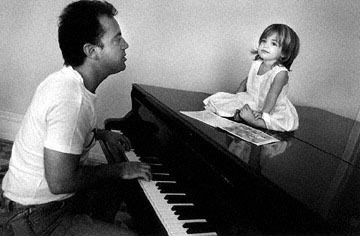
In marking my ten-year anniversary as a teacher, I'd like to offer this somewhat humorous post in celebration of this occasion. I truly love teaching, and I am grateful for the fact that I get paid for doing what I love to do. But as you can imagine, not every day is a triumph, not every day leaves me with the feeling that I have made a positive difference in the life of my students. However, you might be wondering why I would focus on something so negative in order to honor this occasion. Aren't there stories of triumph that I've experienced, you know, like the ones you might witness in a movie like "Stand and Deliver" or "Dead Poets Society"? Of course there have been many of those occasions (though tragically, I have never been hoisted on the back of my students, like Robin Williams in Dead Poet's Society). Yet if I were to write a post like that one I think it would feel a little bit too self-serving. And besides, one thing that my fellow colleagues and I can tell you is that listening to teachers talk about how great they are is not really what we want to hear. As teachers, we need to know that we are not alone in feeling that occasional sense of dejection and failure. The question as a teacher is not whether you've ever felt like Charlie Brown on the football field, but whether or not you can take your lumps and still have the passion to give everything you have. The good news is once you've experienced your own personal "Lucy fail" (whoever she/he may be in any given year), the next time around you can make possible provisions for her potential shenanigans. This whole thing may involve some kind of schadenfreude, it may be a "misery loves company thing", or it may just be a good old-fashioned form of pedagogical commiseration, but in this particular post I would like to offer up a personal sacrifice to my fellow teachers (and anyone else who would like to listen). Below are a list of "lowlights" in my first ten years as a teacher, just a little helpful reminder to teachers everywhere who are struggling to give their best; "you are not alone!"
1. "I hate Mr. Chapman"

OK, technically this wasn't actually said directly to me, however, I was within listening distance, so I'm going to count it. I will not lie, these words sting quite a bit. I suppose the only thing you can compare them to is seeing the contorted face of an angry driver in the car next to you, whom you've never met before, but nevertheless seems to possess a mysterious amount of rage for you in particular. I can still remember vividly the moment when this happened to me. Most of the time you obviously don't hear it said about you (which I am truly grateful for), but the truth is this word (viz. hate) gets tossed about in high school more than it does in the LGBTQ community. I had recently given this girl a detention for chewing gum in my study hall, and since that time she had harbored a grudge against me. Unfortunately, one day, I happened to look in her general direction, right after she looked in mine, and I saw her mouth those infamous words to her friend. I thought, how strange the world of high school, that even while a student disdains you, they reserve a reverential title like Mr. or Mrs. for you. Whatever her motivation, this incident for me was a powerful reminder of just how fleeting and superficial such feelings of anger and disdain can be in high school. Indeed, the next year when I actually taught her as a student (as opposed to having her in a study hall), we had an excellent relationship. Go figure!
2. -"On a scale of 1-10, how beneficial has this class been for you?" -"Negative infinity."

No, this wasn't a middle schooler who wrote that- it's what a senior put on their end of the year evaluation. I'll be honest, my first year teaching high school was a bit of a mess. The first thing that a teacher has to learn to do is figure out where the students are academically, and then work up from there. Well, the first year I tended to teach more from where I was rather than they. Hence, some people liked the challenge and novelty of the class, while others… not so much. One individual in particular really did not buy in, thus leaving me this little treat on the end of the year survey. Although I recognized the need to amend the class and the syllabus, I was half-tempted to approach this individual and instruct them on how to be taken seriously in their critique. I mean if you really want to take me out as a teacher, this is probably not the best way to go about it. In fact, such words are more reminiscent of a toddler stomping their feet and declaring with displeasure; "I hate you… Well, I hate you infinity… Well, I hate you infinity infinity!!!"
3. -"What's you're favorite part about this class?" -"When the bell rings!"

Another evaluation gem! To be fair, I have had students say this to me in the positive sense as well (i.e. I look forward to this class every day). However, this individual, I believe, meant it in the purely negative sense. And all I can say to them is this; "If you found my class to be a purgative experience, and if you found yourself feeling a greater sense of relief and freedom afterwards, then I guess (in a sense) I have kind of done my job as a theology teacher. You're welcome."
4. "My son wanted to be a priest before taking your class..."
Back when I taught middle school, on the first day of class I would begin the year by giving the students some crayons and a picture [of Jesus holding children] to color. After the students colored in silence for a little while, I would ask them what they thought about the exercise? Most would reply with a sort of general nod of acceptance. I would then go on to say in a gentle voice; "Good, I'm glad you enjoyed that, because that's the last time we'll be doing that all year." The look of shock on their faces was priceless. I would then go on to explain that this was not a child's Sunday school class, but rather a real academic subject. After all, God was the one who invented the mind, and it was more than a little insulting (I would argue) to treat his subject as if it were finger painting (no offense to finger painting, under water basket weaving, or any other activity that I might use as a scapegoat in order to make my point). Needless to say, there are real objective answers to the questions that I pose in my class, and it might surprise some parents to know that the answer
isn't always "Jesus". According to some in the field of education, academic rigor is perfectly acceptable for most "core" subjects, just not for the ones involving God. To tell a student that there is a right answer involving God, is tantamount to telling them what their favorite color should be, or informing them that Crunch n' Munch should not be their favorite snack. The nerve of that "religion" teacher. As a result, I was informed in the middle of one parent/teacher conference that I was (in essence) crushing their child's vocation by not giving him an "A". As a matter of fact, I was told in a relatively pointed fashion that their son had wanted to be a priest, but now his desire was waning precisely because he was struggling in my class. The moral of the story is this: if you have a natural affection for God, you should automatically receive an "A" in religion class. Why? Because when you do math, apparently you need a brain, but when you do theology, a pleasant smile and a generous heart is all you need.
5. (Me) "Are you done talking yet?" (Student) "Nope." (Student commences talking again.)
The old wait in silence trick is generally an effective method for a middle school teacher when- for whatever reason- students seem to be ignoring your call for silence. However, on one particular occasion for me, it clearly didn't work. Imagine everyone is ignoring your call for silence, so you employ the old "stare at them with displeasure", until, one by one, they realize, much to their horror, that you have been staring at them angrily the whole time. And then imagine that this works with every student except one. Incredibly, that student continues to talk even while no one else is. Eventually the other students gesture to this student to turn around. Said student finally turns around, prompting the teacher to say; "Are you done talking yet?". To which the student replies; "Nope", and amazingly continues the conversation where he left off. I have heard that teachers have an extra set of eyes in the back of their head, but I never knew, until that moment, that they also had another mythical gift, the capacity to shoot fire out of their eyes. Thus ended the conversation.
6. What would make this class better? "A different teacher."
Let me just take this opportunity to personally thank "end of the year surveys," especially for the opportunity it provides students to engage in drive-by insults, insults that have provided tremendous fodder for this blog post. Sadly, our students do not seem quite as concerned about their teacher's "self-esteem", as they do their own. I understand the need to get the student's perspective, and that there is plenty of occasions where what is said by students is both valuable and encouraging. But even one ad hominem attack, can honestly blot out ten compliments. Sad but true. I do like to occasionally comfort myself by reminding myself that the class I teach is inevitably combustible. In other words, no matter how agreeable the student is to Church teaching (or to the teacher himself), at some point the class is bound to step on your toes. So not only does the student receive a grade for their work, not only is there a specific teacher with a specific personality that you must listen to, but the class is designed to challenge your moral and religious outlook. Any one of those factors can sour a student to the process (if they aren't already sour to it). Indeed, chemistry class may involve juggling explosive compounds, but the compounds of a theology class may threaten to detonate a student's entire cosmos. Students (understandably) do not take this fact lightly. And as for myself, there are certainly times where- in a moment of weakness and frustration- I too might be inclined to recite the above phrase… while naturally substituting the word "teacher" for "student".
7. I love your class Mr. Chapman, I don't understand why no one else does?!

When is a compliment not a compliment? When the following events occur. First of all, one of my favorite expression in the English language is this one: "to damn with faint praise". In the world of compliments this is not only the worst kind of compliment, but it is practically the worst kind of insult. Here you are calmly talking to a student about their day, when all of a sudden they tell you how much they love your class. But oh how quickly victory turns into a defeat, especially in the hands of one who wants to separate themselves from the "chaff" of the other students. For not only are they capable of turning their compliments into an insult in the twinkling of an eye, but, given the chance, they can even manage to compliment themselves- all while insulting you in the process. Indeed, no sooner had this student finished patting themselves on the back for being substantive enough to appreciate my class, they were informing me, unsolicited, that while they themselves were a huge fan, apparently, no one else was. Thank you, favorite student, for making my day!
8. Are you sure that the Holy Spirit is calling you to be a teacher?

Perhaps if I watched a little more Benny Hinn (see above), I would be better suited to be a theology teacher. In psychology, there is an interesting terms known as the "presenting problem". Here, instead of individuals telling you precisely what is bothering them, they begin with some secondary concern. Sometimes this behavior is a subconscious attempt to avoid the real issue. However, in the world of the parent/teacher conference, it tends to be more about what the parent feels that they can complain to you about. Hence, if a child receives a B in theology, and a parent wants all A's for their kid, they can't simply meet with the teacher and say what they want to say, which might go something like this; "If you think that your worthless religion class is going to keep my son/daughter from getting on the "A" honor roll, then you've got another think coming!" It is a Catholic school after all, and perhaps they feel a little limited in their ability to criticize this fact (especially if they are not Catholic themselves). But perhaps there are other methods to achieve this same end. My personal favorite was the time that I was told, as the above suggests, that maybe I chose the wrong career path, and that maybe, just maybe, I wasn't attentive enough to the promptings of the Holy Spirit when I chose my particular career, and maybe I wasn't attentive enough to God's Spirit when I chose to give this child one point less than was required for them to make the all-A honor roll. Nothing like worldly ambition wrapped up in one gigantic ball of phony religious piety.
9. Our child really wanted to take the other theology class, but finally we had to bite the bullet and buy the books for yours.
Sometimes people say things to you that if you didn't hear them yourself you wouldn't believe that came out of someone's mouth. Interestingly, when these words were uttered to me, I had just finished complimenting this parent on how happy I was to have their child in my class. And strangely enough, this was the delightful pleasantry that followed. I prefer to think that it was the most careless non sequitur in the history of mankind, a verbal fumble, if you will, rather than the only other possibility, namely that this parent despised me. But in either case, the truth was laid out for me in a way that really can't be taken back.
10. I have traveled around the world and this is not how you notify a parent of a child's misbehavior!
I know this statement was supposed to somehow put me in my place as a lowly teacher, but all I could think about when I heard it was Will Ferrell and his (once upon a time) reoccurring character on SNL; "I drive a Ford Taurus! I am a district manager! And you will not talk to me this way!" Back in my early days as a teacher, we used to have to write progress reports. Well, on this one particular report, you would have thought I had given this student an "F", and then went on to comment that "they wouldn't amount to anything." In reality, the student had a good grade, I simply explained that they were a bit chatty in class, and that there was room for improvement behavior-wise. Apparently, no criticism had ever been lodged against this child in their entire life, and so as a result this parent brought out the big guns. Indeed, I never knew how impressive business travel was until it was invoked in this particular meeting. Furthermore, I was instructed that if such behavior had been previously observed, then, professionally speaking, I should have informed them immediately. I meekly noted that this was the precise point of the progress report, and that if it had been more of a serious infraction I would certainly have notified them. Even years later the parents of this student could hardly look at me. Sadly, this kind of grudge holding over something so small is not altogether uncommon.
11. After taking your class, I believe even less in God than I did before
Teaching theology to seniors in high school is a little bit like investing in the stock market. One day the investment seems to be paying tremendous dividends, and the next it would almost seem wiser to get out of the market completely. However, the most challenging/important to remember as a teacher (especially a theology teacher) is that you should not be concerned by the fact that students are challenging you, are doubting you, or even are pushing the limits. This is precisely who they must be in order to figure out their identity. Because they tell you you are wrong, crazy, evil, does not
necessarily mean that you are doing something wrong. In fact, it is for this very reason that they get scandalized when you yourself (for example) use the very same bad language that they throw around likes it's nothing. Their life is characterized by instability, and thus it is my/your job, come hell or high-water, to provide a sense of stability, certainty, and immutability for them. Indeed, when I went astray in my own youth, it was a priest whom I remembered from back in grade school that appeared in my memory like a rock of certainty, offering me hope amidst the shifting sands of relativism. Thus, it is my pleasure (most of the time), to give the students a venue to safely challenge, and further consider, the eternal values with which they are presented in class. Otherwise such beliefs would serve as little more than flotsam on the surface of their lives. Consequently, when a student once said this to me at the end of the school year, I did not regard it as an insult, but rather responded in this way; "Good, for if your faith was dismantled by the mere act of questioning it, it must not have run terribly deep." I went on to suggest that if in the future he/she were able to establish any real kind of faith, its sturdiness would be far more sure, especially since it would have endured the blight of skepticism.
12. Isn't it ironic that this was supposed to be a class about God, but it felt more like Hell?
There is so much potential for humor when you teach a class about such things as Heaven, Hell, and Purgatory. In all seriousness, though, if you are truly willing to grow at all as a teacher, you must be willing to take criticism from those who are most inclined to give it. That doesn't mean that everything that they say is of value, true, or even beneficial. Yet in spite of all the unpleasantness, they may sometimes reveal (even while lacking charity) what you really do need to improve in yourself. It is a waste of time resenting students for disliking you, or simply patting yourself on the back for those that love you. The fact is some students will not like you no matter what you do, but if you are sufficiently observant, you can become progressively savvy when it comes to handling challenging classroom environments. In other words, students are not simply irritated with you because you are a saint, or the greatest teacher that ever walked the earth. Rather, consider instead that their displeasure with you may actually involve some particular shortcoming in your personality. But there is an even more practical application to this than becoming a better person. By recognizing how your personality has chaffed certain students in the past, it may be possible to avoid, at least in part, some of the negativity that gets stored up during the year, especially when that negativity expands to the rest of the class. Maybe it's how you approach difficult topics. Or maybe it's just a matter of toning down certain bad habits of yours that are the result of your personality type. For me the challenge comes down to avoiding excessive sarcasm (my friends used to call me Sarcastro). Consequently, if a joke falls in the forest, and the students don't get it, is it still a joke? No, especially when it is directed at a student who is clearly not amused.
13. "You're an a** h***"
I am happy to say that it was during that first painful year as a high school teacher that I was for the first time (and hopefully the last) called an expletive (aloud) in class. I remember responding to that student with these ineffectual words; "You can call me what you want in your own time, Miss/Mr. WhatHaveYou, but when you're in my class you will not speak to me in that way!" Talk about a soft approach. Gheesh! I think I thought at that point it was better to cut my losses than create a giant scene that might devolve into something worse. I must admit at the end of that first year I really did wonder aloud whether the Holy Spirit
was in fact calling me to teach. However, in the end I knew that the problems arose more from my inexperience as a teacher rather than an incapacity to teach. And that's the point- there were many more successes that year than failures, but for me that particular section of kids (I had five in all), colored my entire view of the year. Teaching is never a one-size fits all approach. To be a good teacher, you must constantly be "in school" yourself. If there is a communication breakdown, you can blame everyone on earth, but that approach will never make you a better teacher. Yes, some students are rotten, some dislike you without cause, some disagree with your teaching method... take your pick. But a good teacher
has to be magnanimous more than anything else, he has to be more interested in reaching students rather than blaming them.
14. "Mr. Chapman, would you write a college recommendation for me? I don't actually intend to go there, but the guidance office told me I needed to submit at least one more application."

From the land of backhanded compliments, here comes one more. If you cannot read between the lines, here- let me help you. "I've already asked every other teacher on staff to write a recommendation for me to the colleges that I actually want to attend. But the guidance office told me that I needed to apply to one more, and even though this is a complete waste of your time, I would like to honor you with this request. Here, would you please hold this hoop up for me while I jump through it?" No, actually, I will not.
15. "I was going to vote for you as "teacher of the year", but my mom told me that I had to vote for someone who taught a real class"
This example is actually on loan from another teacher. No, this one didn't actually happen to me, but I could hear a parent saying something similar about theology class. At any rate, it is an invitation to other teachers to share their own "rudest moments" if they choose. Like I said before, there may be an element of schadenfreude here, or maybe its just amusing to hear all of the outrageous things that can happen when kids are held captive in a room for 45 minutes a day. Who's to say exactly? But whether or not you you are willing to share your own personal "fails" as a teacher, I hope that at least a few of these have brought a smile to your face, and even if you're not a teacher, perhaps it gives you a better appreciation of the kind of adolescent minefield that each teacher must face as they enter the classroom everyday.

















.jpg)



.jpg)




















